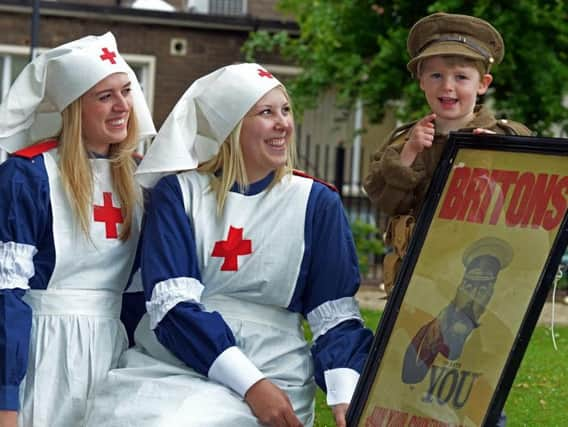Doncaster goes back in time to learn about war


Tomorrow (Saturday June 4) families visiting Doncaster town centre will be asked to make up their minds during a free event, Doncaster Goes to War, that turns the clock back to 1916, a landmark year in the First World War when – for the first time in British history - the Government called up men to fight for king and country.
Based on real-life events, families will be able to step back 100 years as wartime Doncaster is vividly recreated through living history, live street theatre and have-a-go activities ranging from adventurous military training to hands-on crafts – there’s even a guest appearance by 1916’s Mayor of Doncaster.
Advertisement
Hide AdAdvertisement
Hide AdDoncaster Goes to War, in the town's Market Place, is just one of many events this year organised, thanks to National Lottery players, as part of Doncaster 1914-18, a four-year project supported by the Heritage Lottery Fund (HLF), which aims to build a picture of life in the local area between 1914 and 1918 to mark the centenary of the First World War.
“Families will find out first-hand what life was like for those who went to fight, those who helped the war effort at home, and those who - perhaps for moral or religious reasons - chose not to fight,” said Jude Holland, project manager for Doncaster 1914-18.
“In 1916, military service became compulsory for all men aged 18 to 41, later extended to those up to 50, so if you refused to fight you would be punished by law, and sent to prison or even sentenced to death, like Conisbrough’s John Hubert Brocklesby – a local Methodist preacher, who believed men shouldn’t be forced to kill each other.
"You and your family would be forced to wear a white feather as a symbol of cowardice and be shunned by your local community. It was not an easy choice, so people will be asked to consider what they would have done in their ancestors’ shoes.”
Advertisement
Hide AdAdvertisement
Hide AdHighlights of the free Doncaster Goes to War event include the chance to:
Meet original wartime characters face-to-face, such as Doncaster’s wartime Mayor Samuel Balmforth, or the formidable commandant nurses of local hospitals Julia Warde-Aldam, and Alice Mabel Pickering.
Join soldiers at the camp of the Manchester Regiment living history group. Try military training with representatives from the Rifles Regiment or try on a uniform.
Stop off at the nurse’s triage station and have a go at first aid. Discover what women did during the war.
Advertisement
Hide AdAdvertisement
Hide AdMeasure your height and weight at the enlistment station and see how you size up to soldiers from Doncaster’s past.
Choosing not to fight? Find out about trials, and how the white feather became a symbol of peace with the Balby Society of Friends.
Pick up a free activity trail, undertaking a number of challenges to receive a free gift!
Download a free new mobile phone app, allowing you to follow in the footsteps of First World War Doncaster through town walking trails, and or browse the latest events (for Android and iOS).
Advertisement
Hide AdAdvertisement
Hide AdKaren Johnson, assistant director of adults and communities for Doncaster Council, said: “As the First World War happened outside of our ‘living memory’, it can be hard to imagine how life changed for people in Doncaster during 1916.
"Women and children took over the jobs of men sent away to fight, whilst also working tirelessly to raise funds or ‘comfort packs’ for the troops. Many women became nurses, both abroad, and to help with the wounded soldiers sent home – special auxiliary hospitals had to be set up in the area to cope with demand.
"Doncaster Goes to War is an opportunity to put ourselves in their place, giving us a very personal connection to the men, women and children - our local community - who fought and worked so tirelessly during the First World War. Doncaster’s people made a real contribution to the war, and through this event we can uncover their stories.”
For a full event listing, to download the app or for more details, visit www.doncaster1914-18.org.uk